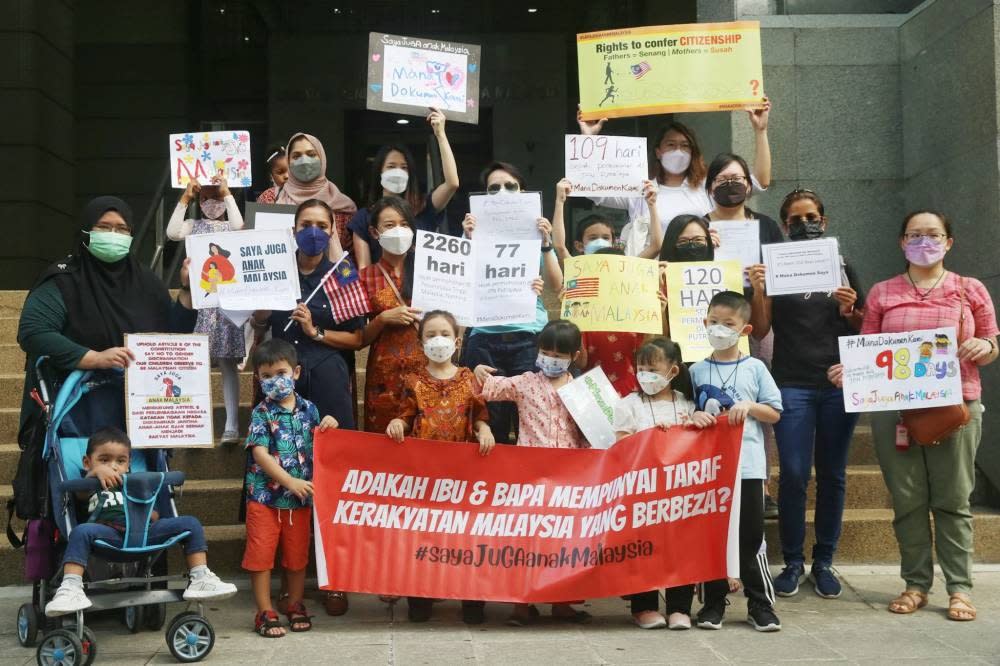Suhakam: Appeals court's ruling of no citizenship for overseas-born kids of Malaysian mums unfair, not in line with ‘Keluarga Malaysia’ concept

KUALA LUMPUR, Aug 7 — The Human Rights Commission of Malaysia (Suhakam) today expressed disappointment over the Court of Appeal’s decision to overturn a High Court ruling allowing mothers to pass on their citizenship to overseas-born children. Suhakam said the decision will negatively impact, not only Malaysian mothers but also their children, particularly in meeting their basic needs including access to medical services, education, citizenship and other rights guaranteed to all Malaysian citizens under Malaysian law.
“Suhakam recalls the government’s commitment to the Convention on the Rights of the Child (CRC) and the Convention on the Elimination of All Forms of Discrimination Against Women (CEDAW), and its commitment to ensuring that domestic legislation should affirm the principles of equality between men and women without any discrimination and to protect and fulfil children’s basic rights.
“As a country that has ratified both instruments, Malaysia should implement the principle of bona fide to ensure the principles of the instruments are implemented and applied in Malaysian laws with sincerity in both intention and action, instead of ratifying without any intention to see it through,” the human rights commission said in a statement today.
According to Suhakam, the Council of Rulers had, on November 23, 2021, approved the recommendation to establish a Committee to work on the amendment of Article 14(1)(b) of the Federal Constitution (Committee) and noted that the Committee was expected to present the outcome of its consultations and research within six months.
“However, the six months have since passed, and no such presentation has been made to date.
“Suhakam stresses the importance of the amendment to Article 14(1)(b) of the Federal Constitution, and any delays in doing so is deliberate negligence of meeting the rights of women and children in Malaysia.
“Many children are separated from their families and even suffer mental health issues due to the uncertainties relating to the status of their citizenship; which is not in line with the intent and spirit of the ‘Keluarga Malaysia’ concept,” it said adding that Malaysian women have been forced to migrate to foreign countries because their children are not accepted in Malaysia.
The human rights commission also urges the government to expedite its earlier proposal to amend Part II of the Second Schedule of the Federal Constitution toward the realisation of Malaysia’s commitment, in line with Malaysia’s current membership in the UN Human Rights Council and its responsibility to achieve gender equality and fulfil the rights of children.
“Suhakam supports the obiter dictum of Datuk S Nantha Balan (Court of Appeal judge) that the status quo should be maintained for the overseas-born children of the six Malaysian mothers who had earlier obtained their Malaysian citizenship papers, until such time the Federal Court decides on their appeal.
“The applications of other Malaysian mothers who had applied for citizenship for their overseas-born children but were not a party to the earlier lawsuit, should be put on hold and not be rejected.
“Suhakam calls on the Government to provide a permanent solution to the plight of these Malaysian mothers and their children, to remain as one family,” the human rights commission added.
On August 5, the Court of Appeal decided in a majority decision that the overseas-born children of Malaysian mothers cannot automatically be Malaysian citizens.
Datuk Seri Kamaludin Md Said, who chaired the panel, was one of the judges who gave the majority decision, while Datuk Azizah Nawawi similarly gave the same decision.
Nantha Balan was the only judge on the panel who disagreed, pointing out that Malaysia’s citizenship laws discriminated against Malaysian women by not allowing them to pass on citizenship to their children born overseas.



